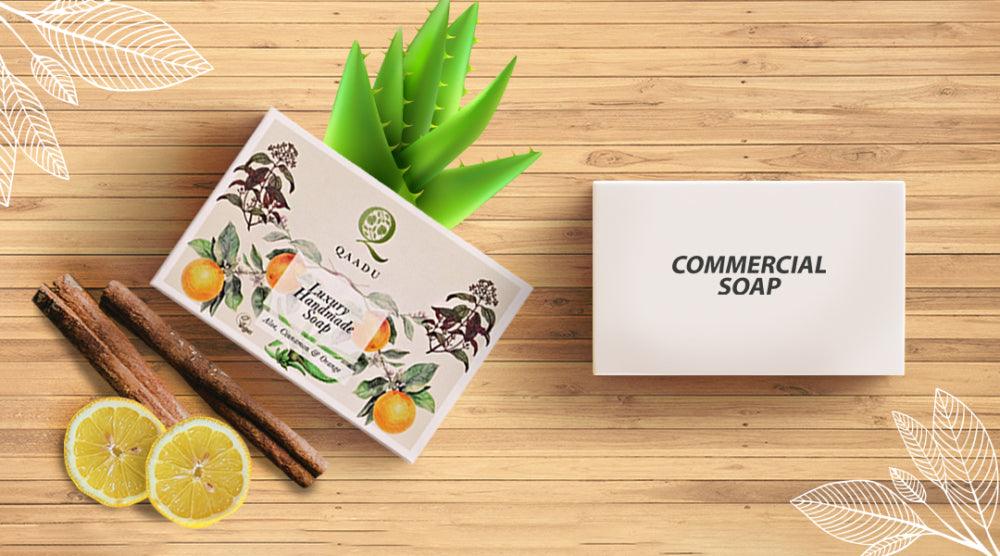
Natural Soap VS Commercial Soap : Can You Spot The Difference

Soap has been used in Ancient Babylon from around 2800 BC, and the remains of Pompeii revealed a complete soap factory. Frontier women created all of their own soaps from converted animal fats (survival on the frontier necessitates using every part of the animal!).
By the 1800s, inexpensively made soap was commonly available. The fact that commercial soaps smell so lovely is one of the reasons for their popularity. The more compounds they have in their perfume, the more exotic it is. That’s why, after using them, your skin feels dry and irritated.
Handmade soaps, on the other hand, include only pure essential oils for scent. Pure essential oils are mild on the skin, have a natural scent, and offer therapeutic effects when compared to artificial scents. But, what’s the big deal about handmade soap vs our modern-day commercial soap? Is natural soap better than commercial soap?
Natural Soap Makes Natural Sense
You may not realize there is such a difference between homemade natural soap and commercially produced products if you are unaware of how soap is made and the fundamental differences between them. Natural soap can appear to be overpriced when compared to commercial soap available at the corner store; however, when you consider not only the benefits of natural soap, but also the level of care and attention that goes into producing it, you will quickly realize that you get what you pay for when it comes to soap.
What Is So Great About Natural Soaps?
Natural soap is prepared in small amounts by hand. The classic cold process method of soapmaking is used by the majority of soapers. Each recipe is individually created, sliced, examined, and packaged by hand. Because of this attention to detail, each bar of soap is of the greatest possible quality. Only the finest natural and organic ingredients, such as olive oil, coconut oil, shea butter, essential oils, and natural scents, are used in the formulations.
The substances were selected for their health advantages and natural healing properties.
This is why using natural soap is so beneficial to your skin.
6 Benefits of using Natural Soap:
- Helps to hydrate and soften dry skin.
- Allow your skin to ‘breathe’ more freely.
- The natural glycerin present in organic soaps moisturizes and nourishes the skin and is suitable for all skin types.
- Rich in vitamins and antioxidants that help nourish the skin.
- Helps reduce the appearance of wrinkles and fine lines.
- Your skin will feel healthier and firmer after just a few weeks
- Helps to reduce blemishes and scars.
Why Are Natural Soaps Better Than Commercial Soaps?
Handmade natural soaps are often more expensive and difficult to come by than commercial soaps. They include harsh chemicals and preservatives that might irritate your skin and cause it to become dry and itchy. As a result, many people with sensitive skin find it nearly hard to use commercial soap without experiencing discomfort or developing a skin condition like dermatitis or eczema. Because commercial soaps are mass produced, the formulas receive less care and attention. This means that two bars from the same brand may differ somewhat.
If you’re thinking about buying commercial soap, keep in mind that those bars of soap on the shelf at your local store aren’t actually soap! Most of the time, you’re actually purchasing a bar of detergent. If you look closely at the labels, you’ll notice that they’re referred to as moisturizing bars, beauty bars, body bars, or any other moniker that avoids calling them soap!
Because of the differences in the manufacturing method and chemical contents, the resulting soap or detergent bar is far harsher than actual soap. Glycerin is a natural by-product of the soap-making process, but commercial manufacturers extract it to use in more profitable goods like lotions and creams. Glycerin is a humectant, which means it attracts moisture to the skin. Taking it out results in a harsher soap-like substance that isn’t as healthy for your skin as true handcrafted soap.
How do you know if the soap you are buying is all-natural handmade soap?
1: Check the ingredients
Read the labels as you would with any product. You’ll be able to understand and pronounce everything if it’s a real bar of soap (now that you know what saponification and sodium hydroxide represent!). A bar of true soap contains only a few ingredients, therefore the process should take around 20 seconds.
2: Ask about cure time
Cure time refers to how long it takes for a bar of soap to fully mature and become a long-lasting bar. A professional soaper will inform you that cure times vary depending on the soap’s ingredients, but each bar should take between 4 and 8 weeks to cure.
3: Beware of fragrances and colors
Although pumpkin spice is popular, you may not want it in your soap (unless it’s made with actual pumpkin and spices). If the bar is brilliant orange, be cautious and inquire about how the soaper achieved that color. You’ve found a superb bar of soap if they can tell you about the herbal infusions and gel stages they worked so hard to accomplish.
Note that not all colour additives are harmful; just make sure you understand what you’re buying by doing some research and speaking with your soaper. We choose to color our soap using natural substances such as coffee, mint from our garden, and other plants. Others may employ “nature identical” pigments, which are created in the lab to have the same molecular structure as its “natural” counterpart.
4: Try out more than one bar of soap
Everyone’s skin is different, as are their water conditions (hard vs. soft), thus their experiences with different bars of soap will vary. If one has hard water then that person might enjoy the salted bubbles and if the water is milder, then one might prefer unsalted bars.
5: Talk with your soapmaker
Some people prefer different soaps for different purposes, such as hair, skin, face, and foot, as well as one for the bath and another for the kitchen. Let your soapmaker know what you want your bar of soap to accomplish. They’ll be able to point you in the appropriate direction for exfoliating your feet and getting rid of the garlic odour after you’ve cooked in the kitchen.


